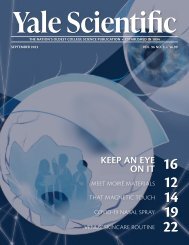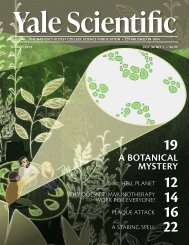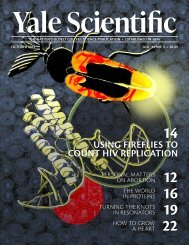YSM Issue 87.4
You also want an ePaper? Increase the reach of your titles
YUMPU automatically turns print PDFs into web optimized ePapers that Google loves.
nutrition
FOCUS
A Smarter Way to Track
By Kevin Wang
Art by Laurie Wang
Nutrition
Staying loyal to a diet is challenging, but
keeping track of precisely what you
eat while you are dieting may be even
harder. Few people have time to stop in the
middle of the day to recall exactly how many
apple slices they had with breakfast, or how
many calories were in the Caesar salad they
ate for lunch. Fortunately, these questions
may soon be a thing of the past.
A Revealing Class of Molecules
Drs. Brenda Cartmel and Susan Mayne,
faculty members in the Chronic Disease
Epidemiology department at the Yale School
of Public Health, collaborated with scientists
from the University of Utah in a recent study
that establishes a novel way of finding out
the amount of fruits and vegetables people
have eaten. Their new method relies on
measuring the amount of a certain type of
pigment, called carotenoids, in a person’s
skin. Carotenoids give many modern birds
and fishes their colors. Beta-carotene and
alpha-carotene, which make carrots yelloworange,
have also been shown to produce
a yellow coloring in people’s palms when
ingested at high levels.
Humans cannot make their own
carotenoids, so we instead get them by
eating fruits and vegetables, which are the
best sources of these molecules. Because the
carotenoids we eat end up as deposits in our
tissues, they are prime biological markers of
vegetable and fruit intake.
Carotenoids have been a major area of
clinical study, but also of mystery. On the
one hand, carotenoids seem to be promoters
of good health: people who ingest them
also have a reduced risk of cardiovascular
disease. On the other hand, carotenoid
supplements have not been found to provide
the health benefits that fruits and vegetables
offer. It seems that there is something
about fruits and vegetables as a whole, not
just the carotenoids contained within them,
that delivers significant health benefits.
Carotenoid supplements—that is, those
not eaten as part of fruits or vegetables—
have been shown either to have no effect or
actually to increase the risk of lung cancer in
smokers, at least in the case of the carotenoid
beta carotene.
A Novel Approach
Since carotenoids have the potential to be
objective measures of fruit and vegetable
intake, scientists have been trying to find
reliable and efficient ways of measuring
them. Traditionally, carotenoid levels have
been measured by taking blood samples
and performing chemical analyses, but this
www.yalescientific.org
October 2014
Yale Scientific Magazine
15


















